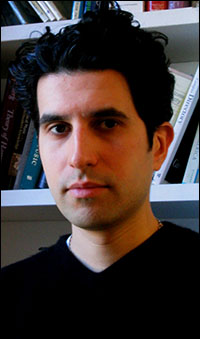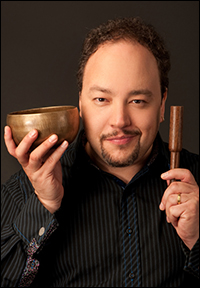
*
It’s a cliché dearly cherished by theatre professionals that every theatre critic is nothing more than a frustrated playwright, with a dozen unproduced scripts moldering away in his or her desk drawer.
There is, of course, some truth to this. Longtime New Yorker theatre critic John Lahr has had his occasional forays into playwriting. The late critic Stanley Kauffmann wrote dozens of plays, none produced, before taking up the critical pen. Recently, Terry Teachout, The Wall Street Journal’s man on the aisle, saw his one-man Louis Armstrong play Satchmo at the Waldorf open at the Westside Theatre.
It’s a rarer case when you find a theatre critic moonlighting in another artistic field — say, opera. But that is where David Cote, the longtime drama critic at Time Out New York, has been spending his off-hours over the past several years.
When not posting reviews of the latest Broadway musical or Off-Broadway play, Cote collaborates on original operas with composers Stefan Weisman and Robert Paterson. It’s not an area of endeavor in which Cote ever expected to end up; in fact, not too long ago, opera was an art form that inspired within him a certain impatience.
“My impression of it was: great music, bad theatre,” said Cote. “It was always lush sonically, and fascinating to see the stories over the centuries that had been adapted into operas and see some of the great roles play out. But I often felt there were missed opportunities to tell compelling stories.”
His attitude toward opera began to shift after seeing Baz Luhrmann’s lavish and unorthodox 2002 Broadway production of La Bohème.
| |
 |
|
| Stefan Weisman |
“It was theatrical, really inventive,” recalled Cote. “It was kind of strange and myserious in a Mac Wellman way, and the music was very minimalist. It just kind of blew my mind. I thought, ‘Oh, new opera can be as interested as new, experimental theatre.’”
Soon after, he approached Stefan Weisman, an old Bard Collage classmate of his, about possibly collaborating on an opera. When Weisman got the nod from an English company called Second Movement Opera to write a 30-minute opera as a companion piece to Leonard Bernstein’s Trouble in Tahiti, the composer drafted Cote as his writing partner.
The resultant original opera was called Fade. It told the story of a wealthy American couple who build a technically advanced, half-“green” house in the Adirondacks. However, halfway through the story, the power goes out.
Describing the piece, Cote called it “a little satire, a little relationship drama, a little sad, a little Wallace Shawn-y perhaps, a little Edward Albee.” The opera was performed in 2008 in Hoxton Hall and received a few positive notices. “If it’s Americans being obtuse and materialistic, the English love it,” joked Cote. Cote and Weisman are currently collaborating on a full-length opera called The Scarlet Ibis. It is based on well-known 1960 story by James Hurst about two young, Southern brothers, one strong and healthy and the other weak and dependent on the older. It will be produced at New York’s HERE Arts Center in January 2015 at part of the PROTOTYPE festival.
| |
 |
|
| Robert Paterson |
“So far, when we show them to audiences, people laugh, in a good a way,” Cote said of the material, unusual for an opera. “That’s what I’m happy about. They’re accessible, they’re humorous. The music is accessible as well. We’re definitely not going the route of abstract and atonal.”
Perhaps inevitably, when writing opera libretti, Cote will unconsciously draw on his long exposure to musical theatre and his collaboraters are forced to rein in his more non-operatic writing tendencies.
“Sometimes if I write the libretti like lyrics, they’ll be like, ‘This is too rhyme-y. This is too square,’” he told. “Libretti are very different from song lyrics. It you make it too da-da-da-da-da, rhyme and rhyme — it doesn’t work. It doesn’t breathe enough.”
One advantage of writing about the theatre, but writing for opera, is that Cote doesn’t have to wrestle with any perceived perceived conflicts of interest.
“It feels safer,” he admitted. “Frankly, if I really hustled my work as a playwright, I’d feel more conflicted. I’m not using my position to get an advantage. Either people think my work is good enough to produce or they don’t.”









